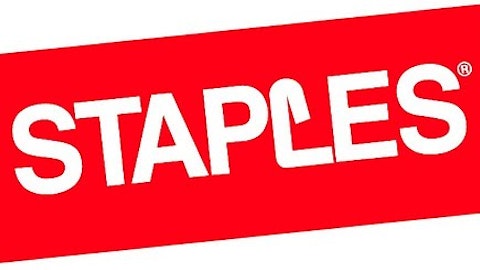Department stores appear to be good investments as we approach their earnings release dates. Several are achieving comparable-store sales gains, while others are growing their location counts at solid profitability. Moreover, the companies tend to return cash to shareholders in the form of dividends and repurchases, to a greater extent than in other industries. Lastly, the stocks look appealing at their current valuations.
Global giant still a good bet
Wal-Mart Stores, Inc. (NYSE:WMT) is the operator of retail units under 69 banners across the world, by way of three business segments:
1. Wal-Mart Stores, Inc. (NYSE:WMT) U.S. contributes about 59% of total sales through 4,005 units as of January of this year.
2. Wal-Mart Stores, Inc. (NYSE:WMT) International is attributable for 29% of sales, approximately, stemming from its 6,148 units.
3. Sam’s Club brings in about 12% of total sales by way of 620 locations.
By merchandise type, Wal-Mart Stores, Inc. (NYSE:WMT)’s sales are roughly: 55% Grocery and consumables; 24% fuel and other categories; 8% technology, office, and entertainment; 8% home and apparel; 5% health and wellness.

The shares are trading at a forward P/E of 13.4 and are worth considering. Despite the company’s discount format, its gross margins rival those of its peers. Also, it is slowly buying back stock and pays a 2.4% dividend yield.
Popular fashion retailer in growth mode
Macy’s, Inc. (NYSE:M), through the Macy’s and Bloomingdales names, operates 840 stores in 45 states, as well as Internet sites, as of February of this year. Sales by product category are as follows:
1. Feminine accessories, Intimate Apparel, Shoes and Cosmetics provide about 38% of the total.
2. Feminine apparel contributes 23% of sales.
3. Men’s and Children’s products bring in 23% of total sales.
4. Home/Miscellaneous offerings contribute 16% of the total.
The company is generating same-store sales increases, supporting improvements in the profit margin. I believe this is a by-product of investments in its product lines and the tailoring of merchandise in particular stores, as well as spending on its sales force. With the company also repurchasing shares rather aggressively, earnings per share ought to remain on an upward trajectory.
Macy’s, Inc. (NYSE:M) shares’ forward P/E ratio is 10.8, and it is a solid choice. Review also my previous posting on department stores: “3 Department Store Stocks for Your Portfolio .”
An overall solid company
The TJX Companies, Inc. (NYSE:TJX) operates more than 3,000 off-price apparel and home fashion retail stores in the U.S. and worldwide. Its four divisions as of May 2013 were:
1. Marmaxx consists of its T.J. Maxx and Marshalls chains in the U.S., including about 1,940 stores. It contributes about 66% of total sales.
2. HomeGoods retails home fashions in the U.S. through about 415 locations. It delivers about 11% of total sales.
3. The TJX Companies, Inc. (NYSE:TJX) Canada operates the Winners, Marshalls, and HomeSense franchises in Canada by way of 222 stores, approximately. Its sales are about 10% of the total.
4. The TJX Companies, Inc. (NYSE:TJX) Europe is the operator of T.K. Maxx and HomeSense stores in Europe through about 343 stores.
The TJX Companies, Inc. (NYSE:TJX) is likely experiencing modest same-store sales gains on a relatively flat store count. It is benefiting from heightened store traffic in the U.S. and improved margins in Canada. It looks like store re-modelings are having a positive impact on results domestically, while enhanced pricing power is supporting profits in Canada.
The shares, up sharply already this year, are trading at a forward P/E of about 16.2. Cash is being utilized for buybacks, as well as property expenditures. On that note, it believes it can grow the store base 50% over the long term, while also likely utilizing cash for buybacks and dividends. For that reason, the stock is a decent long-term selection.
Arkansas-based department store faring well
Dillard’s, Inc. (NYSE:DDS) sells merchandise through more than 300 locations, including 18 clearance centers, along with a website. Stores are primarily located in the southwest, southeast, and Midwest regions of the U.S. The merchandise mix for fiscal 2012 (ended Feb. 2, 2013) was:
Ladies’ apparel, 22%; Men’s apparel and accessories, 17%; Shoes, 16%; Cosmetics, 15%; Ladies’ accessories and lingerie, 15%; Juniors’ and children’s apparel, 8%; Home and furniture, 5%.
Dillard’s, Inc. (NYSE:DDS) has seemingly delayed store expansion plans this year, in favor of initiatives aimed at gross margin improvements. Indeed, product margins have improved of late on a year-over-year basis, with the gain flowing to the bottom line. Thanks also to repurchases, earnings are trending around 20% higher versus the prior year. Importantly, comparable-store sales remain steady to slightly up.
The shares’ forward P/E multiple is 10.1 at this juncture. Its rise has lagged that of the S&P 500 index. As such, this may be a good opportunity to reap gains from a company with rapid earnings growth prospects.
Finally
Keep an eye on these stocks as they report earnings for the most recent quarter. Scheduled earnings release dates are: Wal-Mart Stores, Inc. (NYSE:WMT), Aug. 15; Macy’s, Inc. (NYSE:M), Aug. 14; The TJX Companies, Inc. (NYSE:TJX), Aug. 20; Dillard’s, Inc. (NYSE:DDS), Aug. 14.
As a group, they are worth looking into for near-term price upside. The companies utilize cash wisely and would be good selections for most portfolios, growth, income, or long-term focused.
Damon Churchwell has no position in any stocks mentioned. The Motley Fool owns shares of Dillard’s.
The article 4 Department Stores for Your Portfolio originally appeared on Fool.com.
Copyright © 1995 – 2013 The Motley Fool, LLC. All rights reserved. The Motley Fool has a disclosure policy.





